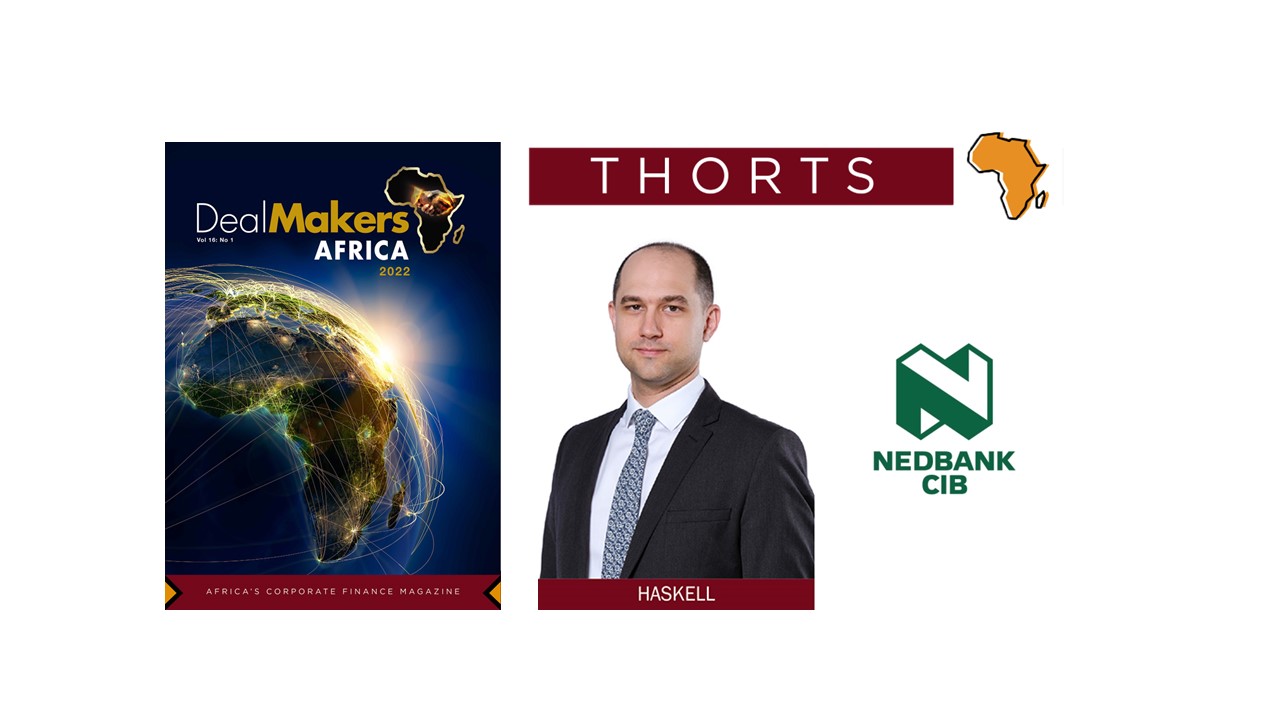WARRICK HASKELL
It should come as no surprise that the M&A space, both domestically and internationally, has been characterised by caution over the past 12 to 18 months. Today, despite the lingering spectre of new COVID-19 waves, at least a measure of economic and commercial stability appears to be returning, which means that many organisations are again looking for M&A opportunities, albeit still with a healthy pinch of caution.
At Nedbank Corporate and Investment Banking (CIB), we’re noticing several clear trends emerging, which we are confident will become key drivers of M&A activity over the course of 2022.
The first of these, especially in the South African context, is the search for growth. There are a number of companies that have managed to sustain their operations through the past (very challenging) 24 months, but which are now largely tracking GDP in terms of their ongoing growth. These organisations obviously recognise the importance of restoring their profitability trajectories, and many are looking, or will be looking, to M&A as a means of bolstering their long-term growth; not just at a top-line level, but also in terms of enhanced efficiencies, unlocking synergies, and casting their operational nets wider into sectors where they believe there are good prospects.
To compliment these direct efforts to underpin and bolster revenue and profitability growth, the recognition of the need to secure supply chain resilience is also likely to be a key driver of M&A activity in the coming months and years. COVID-19 and the resulting lockdowns cast a bright spotlight on the supply chain vulnerability of many businesses. This was especially true of organisations that had a significant dependency on imports within their supply chains, and many of these companies will want to enhance the resilience of such supply by seeking out alternative sources or reliable backup supply options, preferably on home soil. This has the potential to give manufacturing in South Africa a much-needed shot in the arm, provided that the country’s energy security and labour challenges can be effectively and timeously addressed.
A final trend worth noting is a gradual but steady increase in foreign investors looking for opportunities to inject cash into areas of future value and growth within emerging markets. The volatile situation in Eastern Europe has understandably dulled the appeal of investing in that region, and this is likely to offer at least some benefit for South Africa, which is still recognised as a stable, high-potential emerging market, despite its own economic and political challenges. This is already becoming evident within industries focused on export-related products, particularly commodity-focused entities.
Of course, while the local and global economic environments are now undoubtedly more conducive to M&A than they were this time last year, or two years ago, it’s unlikely that this will translate into a sudden, massive upswing in activity in the sector. There are factors besides the economy that are having an increasingly significant influence on the ability and willingness of many companies to engage in M&A. An emerging theme is the need to exercise caution in the allocation of capital due to the likelihood of shifting shareholder expectations going forward. The growing requirements for businesses to demonstrate meaningful ESG commitments will likely see many companies being more selective in the allocation of the capital they have, to ensure that they can meet the expectations of current and prospective shareholders to steadily increase their environmental and social investments.
Apart from the possible reticence to spend money on M&A that this shifting focus may cause, it’s also likely that the heightened shareholder focus on ESG, and ESG reporting, will become an increasingly prominent consideration in M&A transactions in general going forward.
While it’s difficult to predict exactly where any uptick in M&A will be most evident in the coming year or two, it’s likely that we will see activity involving entities positioned to tap into the global food market, given the uncertainty of food security in Europe, together with commodity-based entities/investors that need to invest, or return to shareholders, the large accumulated cash reserves.
Warrick Haskell is a Senior Associate | Advisory Nedbank Corporate and Investment Bank
This article first appeared in DealMakers AFRICA, Africa’s corporate finance magazine
www.dealmakersdigital.co.za



